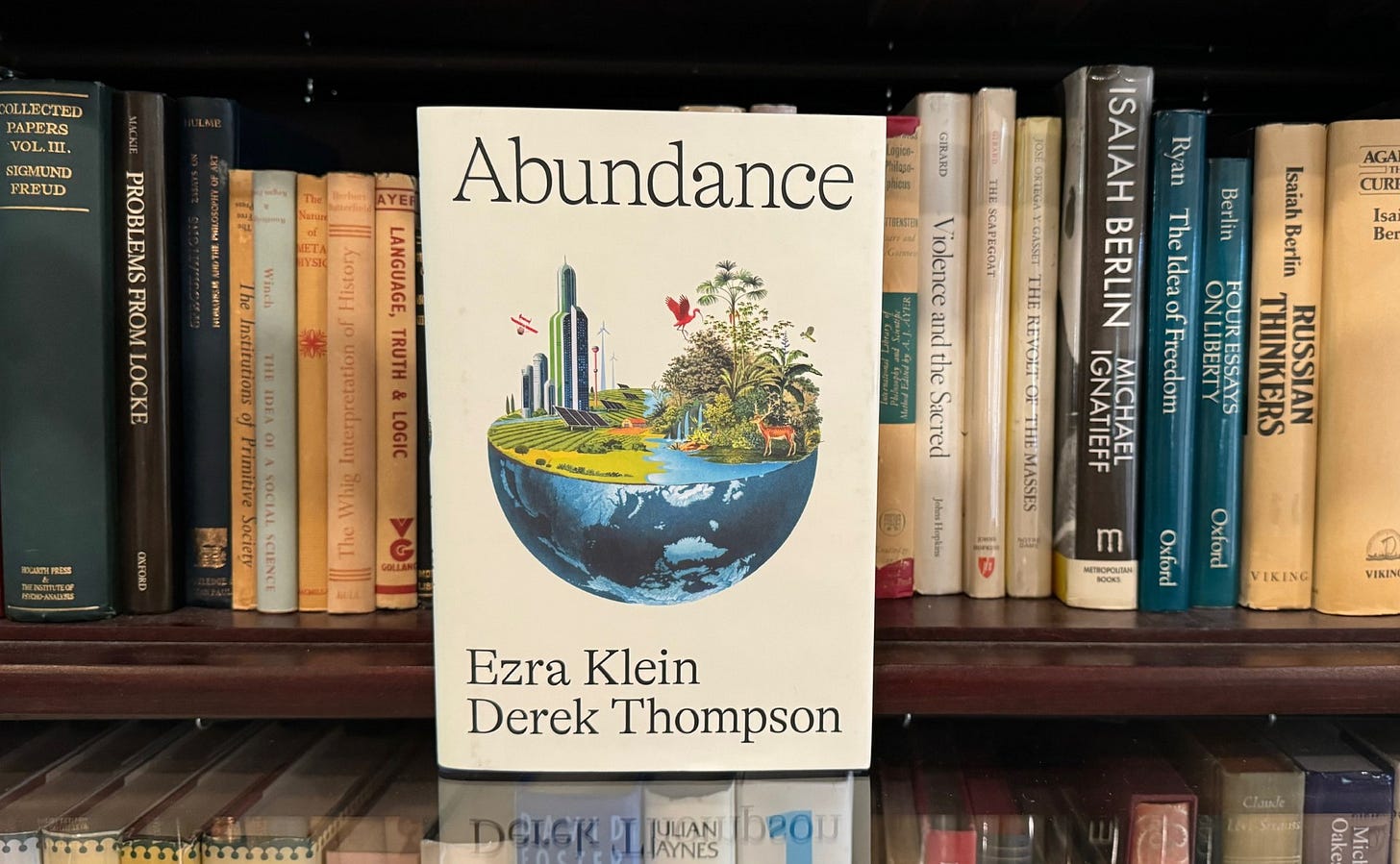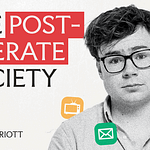Welcome to the third installment of our interview series here at The Honest Broker—also available on our new YouTube channel and Apple Podcasts.
Today, I’m happy to share my conversation with Derek Thompson.
Please support The Honest Broker by taking out a premium subscription (just $6 per month).
When Derek came to Substack, he said he wanted to focus on three issues:
The Abundance agenda, building on the bestselling book he’s published with Ezra Klein.
Science in a way that’s both curious and skeptical.
The anti-social century. (Derek published a great piece on the subject at The Atlantic in January.)
I wanted to focus on that last issue in our conversation. This intersects with issues about which I care deeply: the loneliness epidemic, alienation driven by adoption of new technologies, and the impact of AI on our lives.
You can find more of Derek’s work on his newsletter.
Highlights from the Derek Thompson Interview
For the full interview, check out the video at the top of the page.
Jared: Derek Thompson, thanks for joining us.
Derek: It’s wonderful to be here.
Jared: When you launched your newsletter, you had this nice sort of thesis statement. You said ‘I’m going to cover three topics.’ One was them was the Abundance agenda, the other was covering science in a way that’s both curious and skeptical. And then there was a third: the anti-social century. That one stuck out to me. How bad is it out there?
Derek: I think many writers live with a kind of hypocrisy at the heart of their work. And I would say that my personal hypocrisy is that I’m mostly optimistic about science and technology, but I’m also pessimistic about the social changes that come with science and technology. And so in a weird way, I find myself often writing about how thrilled we should be about all sorts of advances in medical technology and biotech. I’m fascinated, by the way, with just GLP-1s and everything they seem to do. And at the same time, I find myself consistently drawn to the way that modernity changes habits and behaviors in ways I find often quite bad.
I wrote this cover story for The Atlantic on the phenomenon that I called the anti-social century. And the antisocial century emerged really from one key statistic that I found in the American Time Use Survey. One of the things that they ask is, how much time do you spend socializing with other people in face-to-face communication? And the key statistic that I found is that the average amount of face-to-face socializing in this century has declined for all Americans by about 20% and for young Americans by about 40 to 50%. What I’m identifying here is the fact that in the 25 years since Robert Putnam wrote Bowling Alone there has been an antisocial quarter of a century. It touches the anxiety crisis that we see among young people. I think it changes our politics by alienating us from our neighbors. I think there are so many different tendrils that emerge from the phenomenon of the anti-social century.
Jared: There’s a bit of an irony when you read Bowling Alone. He has a very optimistic chapter about the internet. When he’s writing around the year 2000, the internet is still new. And he’s like, oh, we’re going to form community networks. People are going to organize ways to go out together. They’re going to use the internet to have conversations with their neighbors.
Derek: Oops!
Jared: In a revised introduction to the second edition, he admits that he whiffed it. He was wrong. He thought it could maybe bring us together, especially if we created small, intentional, locally based communities. He was essentially imagining the Nextdoor app, which is of course a cesspit. No one thinks ‘Wow, I like my neighbors more because we interact on Nextdoor.’
So, I guess we could ask specifically about what the internet is doing. Because I know lots of 14-year-olds, and you’ll ask them how they spend time with their friends. And the number one answer they give is Discord. It’s sitting in voice chats rather than going out. They might watch YouTube videos and stream them live and then just talk over voice chat. Even with people who are in the same city as them! I grew up on the internet, but there was still a sense that there was your online life, but then you go and do stuff. To put it very coarsely, there’s just been this massive decline in going out and doing stuff.
Derek: There’s a huge decline in going out and doing stuff. There’s specifically a huge decline in partying. This was one of the single biggest pieces I’ve written on Substack so far: ‘The Death of Partying in the USA.’ I think the way the American Time Youth Survey puts it is hosting or attending parties, social events, or ceremonies has declined something like 70% for young people.
You might ask: how do you know that texting people or hanging out on Discord or playing a video game with your bros in your headset isn’t a perfect substitution for hanging out in the physical world that makes us just as happy? That’s a very complicated and rich question. I think it deserves a lot of research. But I think it’s important to put two facts next to each other. Number one: the decline of face-to-face socializing. Number two: the fact that people, and young people in particular, are not happy with their lives. I do want to point out that this incredibly important shift in the way that we are with each other in our friendships and our relationships has coincided with an absolute plummeting of life satisfaction. And one reason I think Putnam was wrong is that we aren’t ourselves on the internet.
Jared: There’s an idea that I’ve been toying with more and more that one of the reasons that we’re so comfortable being mean to each other online is that it’s very easy to view each platform that you’re on or each account that you have as a different self. It’s like a completely different personality that I get to try out. You get to A/B test the self, and you don’t immediately feel the negative social consequences because you could just make another account. Where in real life, there’s no rebranding.
Derek: I don’t think I’ve ever quite put it like that. Just to challenge it: I don’t really believe that most people think of themselves as being a kind of unified self in every circumstance. There’s who I am at the office. There’s who I am at home. We are different people in different circumstances. And that’s a truth that pre-exists and co-exists with the internet itself. But I do think there’s a kernel of truth in what you’re saying. I have a sense as I move throughout my day that I’m a different, I’m purposefully code-shifting and self-shifting as I move between contexts. And so I do think that you might be right that a part of what we’re putting our finger on here, a part of what makes the internet strange, is that we assume these kind of sideways identities that are related to us but not fully us. There’s a deliberate sense of performance.
What I think is causing that is the distinction between one-to-one communication and broadcast. That’s always a weird thing about podcasts. When you’re having a one-to-one conversation, a real one, like if there weren’t cameras here, I would have no choice but to just focus on you. But when I’m typing into a box, where I’m holding a self-facing camera for YouTube or for Instagram, I can’t think about any other one particular person. And because I can’t focus on 1,000, 10,000, or 100,000 people at once, I’m really focused on myself.
Jared: I occasionally will meet someone who’s maybe seen some of my YouTube videos, and they’ll say I’m quieter than they expected. I don’t even have a particularly large personality on YouTube.
Derek: But there’s no listening on YouTube. Why would you ever make a video of you listening?
Jared: Exactly. I guess if that form of communication is so unnatural, then it seems plausible to say that it’s bound to have some at least strange consequences when it becomes the dominant form of communication. When most of your communication is broadcast rather than face-to-face, how you think about communication is going to eventually shift.
Derek: There are studies that have basically been done, I think at Penn Wharton, that show that if you write a letter to one person versus writing a letter that you know many people will read, the contents of that letter change. When you’re writing to a thousand people, you just talk about yourself. And so just knowing that you’re going from talking to one person versus many people makes the content of the message more focused on the self.
I think you could extrapolate a finding like that to the idea that we’re moving from a more physical world to a more digital world conversation. I find that when I’m talking to other people, I’m living in their mind a lot of the time. To be in front of your phone, posting, you’re not inside of any one person’s mind. You’re often inside of your own. I do think that maybe one reason why we have rising rates of anxiety and depression is that people who are anxious and depressed are lost inside of their own thoughts.
Jared: I have been wondering about the turn that people have toward forming relationships with various LLMs, with various forms that we call AI. You wrote a piece about the way that people are turning to AI for therapy. I believe the website Catholic Answers released a sort of AI priest who would give spiritual advice. Then he said heretical things, and they quickly defrocked him. On Reddit, there are whole subreddits dedicated to forming relationships with AI. So more and more we’re turning to having these very intimate conversations with machines rather than human beings.
Derek: I think there’s two questions there that are both really interesting. Question number one is, why is AI so good at being a therapist? And then two, what’s the cost of turning to AI as a therapist or a friend if it seems to be working for people? My wife’s a clinical psychologist. I’ve talked to people in her program about the fact that they consider AI to be quite a talented therapist at delivering cognitive behavioral therapy in certain steps and exposure therapies. Some therapy is quite schematic, like Cognitive Behavioral Therapy. And so these are skills that I think you really could teach in artificial intelligence.
Another part of being a good therapist is validation. This technology is very good at doing lots of things that therapists are supposed to do, but a great therapist is not just a professional validator. There are people who have obsessive compulsive disorder. Their compulsions are disordered. AI is not as good at telling people that their delusions are delusional, that their problems are actually problematic, that their thought patterns are actually disordered.
People who get into these long conversations with LLMs end up in some cases going to the hospital because their delusions are deepened by their interaction with these technologies, not resolved or remedied by their interactions with them. A part of being a good therapist is telling your patients when they’re wrong. A part of being a good friend is telling your friends when they’re nuts. And this technology has been honed through both engineering and human feedback to be sycophantic. The problem that you’re identifying is larger than just AI as a therapist or AI as a friend. This really, I do think, is a fundamental problem with artificial intelligence, period. It can’t tell you when you’re asking the wrong question. What I see is an engine for the mass production of narcissism at scale
Jared: You’ve also written on the literacy crisis in the United States or the decline of reading. Do you think that this is in any way related to your interest in the antisocial century?
Derek: I do think we’re seeing the end among college students of writing as well. We’re already seeing the decline of reading. Now we’ve invented this tool whereby if you’re assigned take-home essay on anything—a book or a piece of history—you can turn to a large language model and it will essentially write that essay for you. If thinking is like pitching and throwing a baseball is practicing for pitching, what is practicing for thinking? I think it’s reading and writing. And so if we now have clear statistical and anecdotal evidence that people are reading less and outsourcing the learned skill of writing to large language models, where is deep thinking supposed to come from in the future?
Jared: We’re looking for book recommendations for our audience. Do you have something for us?
Derek: Philipp Blom’s The Vertigo Years. Not only is it an absolute blast to read, it is about the period of time that I consider most interesting in human history. It’s an era where so much of what we consider to be the modern world was invented. We didn’t just invent cars and planes. We invented aspirin and basketball. It’s a beautiful book in explaining essentially how these inventions made the Western world lose its mind.
Jared: Derek Thompson, thank you for joining us.
Derek: Thank you.









